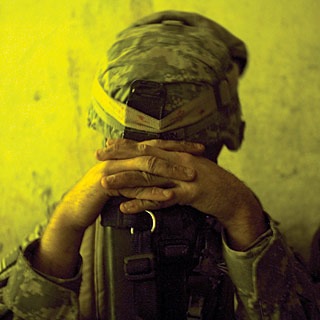
As the comments and correspondence about my PTSD story and posts accrue, I've been pondering ways to pull out some of the most interesting, powerful, and affecting. I finally decided to just start posting some, sometimes with commentary, sometimes without. This is a story of many different colors and textures.
I'll start with this excerpt from a long, eloquent blog response to my story about PTSD at Scientific American by Kayla Williams, a vet of the Iraq War who blogs at VetVoice. Williams is accumulating quite a strong run of posts there, including posts on torture, being a woman veteran, and suicide.
This is part of her take on PTSD and the issues raised in my article.
When I speak out and encourage veterans to seek help, I frequently use the phrase (wish I remembered where I picked it up!) "PTSD is a normal reaction to profoundly abnormal events." What I mean by that is: If you see something traumatic (like your buddy getting blown up in front of you), it seems perfectly "normal" that you might re-experience the event, avoid things that remind you of it, have trouble sleeping, or be particularly alert to danger (hypervigilant) for some period of time.
All of these are among the symptoms of PTSD, and many of the people I was in Iraq with had these symptoms, along with increased irritability and anger management problems, for months after we got back. A lot of us "self-medicated" - got drunk a lot - to avoid some of the feelings or memories we were experiencing. So this is a clear case of me mis-using the term PTSD, since we didn't all have PTSD - we all had some symptoms of PTSD.
For most of us, those symptoms faded over time and we were able to successfully readjust to civilian life. I'm the first to admit that I still have some issues: jumpy at sudden loud noises, hate driving over trash in the road, lose my temper more easily than before the war. But I do not think that I actually have PTSD or deserve a disability rating for it; it does not negatively affect my ability to have a successful job and relationship today, and overall I think I'm doing pretty well. But if you had you assessed me for PTSD within the first year of getting back from Iraq, I probably would have been diagnosed. I'm pretty sure I met the criteria at that time. Given what was available and known then (2003), I might have gotten group therapy every other week, medication, a discharge from the military, and then a disability rating from the VA. Would that have done me any good at all?
[snip]
One of my fears is that the system as currently designed not only does not provide evidence-based treatment (see the RAND study for details on the shortcomings), but also may, as Dobbs says, "encourage chronic disability."
My husband suffered a TBI in Iraq and developed PTSD. The letter he got from the VA basically said (I'm paraphrasing here), "We're giving you disability because you'll never be able to hold down a job or have decent interpersonal relationships. Have some money every month for life. Sorry about your luck." Let me tell you: That was horribly disheartening to read. I mean, why get out of bed the next day? You've been doomed, you're screwed, you're never getting better.
Now I'm going to say some things that you may hate me for saying: I think that the current system is broken and needs profound revision. We were desperate for my husband to be rated high enough on the military scale for him to qualify for TriCare, because we feared being uninsured in America today with his issues. But he got that VA rating about 2 years post-injury without having gotten high-quality, evidence-based treatment. I wish that instead of that letter and those payments, he had gotten intensive care and support that really focused on recovery, while delaying making a permanent judgment on his long-term prospects a little longer.
...
'll be honest: I'm scared to post these thoughts. Some of the comments on the Scientific American site in response to this article are very emotional. There seems to be a lot of fear that any suggestion of changing the system means short-changing veterans, taking away their benefits, minimizing their suffering, denying very real problems. So let me be clear, once more: I believe PTSD is real. I want all veterans and servicemembers who are struggling with the invisible wounds of war to have access to high-quality care. But I want that care to be based on careful, accurate diagnoses so that the right treatments can be given. I want to personally be more careful about using the term "PTSD," not confusing relatively "normal" readjustment challenges with the disorder that haunts sufferers for years. I want us all to work to reduce the stigma that discourages people from seeking help.
I also think that over-diagnosis minimizes the very real suffering of those with full-blown PTSD. I support additional scientific and medical research to improve diagnosis and treatment. We owe no less to those who suffer due to their service.
You really want to read the whole thing.
